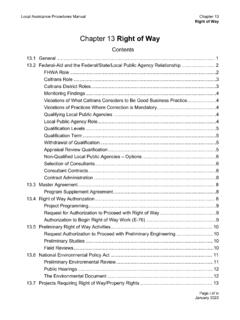Transcription of 1 THE RIGHT TO THE CITY David Harvey
1 1 THE RIGHT TO THE CITY David Harvey CHANGE THE WORLD SAID MARX; CHANGE LIFE SAID RIMBAUD; FOR US, THESE TWO TASKS ARE IDENTICAL (Andr Bretton) - (A banner in the Plaza de las Tres Culturas in the City of Mexico, site of the student massacre in 1968, January, 2008) We live in an era when ideals of human rights have moved center stage both politically and ethically. A lot of political energy is put into promoting, protecting and articulating their significance in the construction of a better world. For the most part the concepts circulating are individualistic and property-based and, as such, do nothing to fundamentally challenge hegemonic liberal and neoliberal market logics and neoliberal modes of legality and state action.
2 We live in a world, after all, where the rights of private property and the profit rate trump all other notions of rights one can think of. But there are occasions when the ideal of human rights takes a collective turn , as when the rights of labor, women, gays and minorities come to the fore (a legacy of the long-standing labor movement and the 1960s Civil rights movement in the United States that was collective and had a global resonance). These struggles for collective rights have, on occasion, yielded some results (such that a woman and a black become real contestants for the US Presidency).
3 I here want to explore another kind of collective RIGHT , that of the RIGHT to the city. This is important because there is a revival of interest in Henri Lefebvre s ideas on the topic as these were articulated in relation to the movement of 68 in France, at the same time as there are various social movements around the world that are now demanding the RIGHT to the city as their goal. So what might the RIGHT to the city mean? The city, as the noted urban sociologist Robert Park once wrote, is: "man's most consistent and on the whole, his most successful attempt to remake the world he lives in more after his heart's desire.
4 But, if the city is the world which man created, it is the world in which he is henceforth condemned to live. Thus, indirectly, and without any clear sense of the nature of his task, in making the city man has remade himself."1 If Park is correct, then the question of what kind of city we want cannot be divorced from the question of what kind of people we want to be, what kinds of social relations we seek, what relations to nature we cherish, what style of daily life we desire, what kinds of technologies we deem appropriate, what aesthetic values we hold.
5 The RIGHT to the city is, therefore, far more than a RIGHT of individual access to the resources that the city embodies: it is a RIGHT to change ourselves by changing the city more after our heart s desire. It is, moreover, a collective rather than an individual RIGHT since changing the city inevitably depends upon the exercise of a collective power over the processes of urbanization. The freedom to make and remake 2 ourselves and our cities is, I want to argue, one of the most precious yet most neglected of our human rights .
6 But since, as Park avers, we have hitherto lacked any clear sense of the nature of our task, we must first reflect on how we have been made and re-made throughout history by an urban process impelled onwards by powerful social forces. The astonishing pace and scale of urbanization over the last hundred years means, for example, we have been re-made several times over without knowing why, how or wherefore. Has this contributed to human well-being? Has it made us into better people or left us dangling in a world of anomie and alienation, anger and frustration?
7 Have we become mere monads tossed around in an urban sea? These were the sorts of questions that preoccupied all manner of nineteenth century commentators, such as Engels and Simmel, who offered perceptive critiques of the urban personas then emerging in response to rapid These days it is not hard to enumerate all manner of urban discontents and anxieties in the midst of even more rapid urban transformations. Yet we seem to lack the stomach for systematic critique. What, for example, are we to make of the immense concentrations of wealth, privilege and consumerism in almost all the cities of the world in the midst of an exploding planet of slums ?
8 3 To claim the RIGHT to the city in the sense I mean it here is to claim some kind of shaping power over the processes of urbanization, over the ways in which our cities are made and re-made and to do so in a fundamental and radical way. From their very inception, cities have arisen through the geographical and social concentrations of a surplus product. Urbanization has always been, therefore, a class phenomena of some sort, since surpluses have been extracted from somewhere and from somebody (usually an oppressed peasantry) while the control over the disbursement of the surplus typically lies in a few hands.
9 This general situation persists under capitalism, of course, but in this case there is an intimate connection with the perpetual search for surplus value (profit) that drives the capitalist dynamic. To produce surplus value, capitalists have to produce a surplus product. Since urbanization depends on the mobilization of a surplus product an inner connection emerges between the development of capitalism and urbanization. Let us look more closely at what capitalists do. They begin the day with a certain amount of money and end the day with more of it.
10 The next day they wake up and have to decide what to do with the extra money they gained the day before. They face a Faustian dilemma: reinvest to get even more money or consume their surplus away in pleasures. The coercive laws of competition force them to reinvest because if one does not reinvest then another surely will. To remain a capitalist, some surplus must be reinvested to make even more surplus. Successful capitalists usually make more than enough surplus to reinvest in expansion and satisfy their lust for pleasure too. But the result of perpetual reinvestment is the expansion of surplus production at a compound rate - hence all the logistical growth curves (money, capital, output and population) that attach to the history of capital accumulation.







